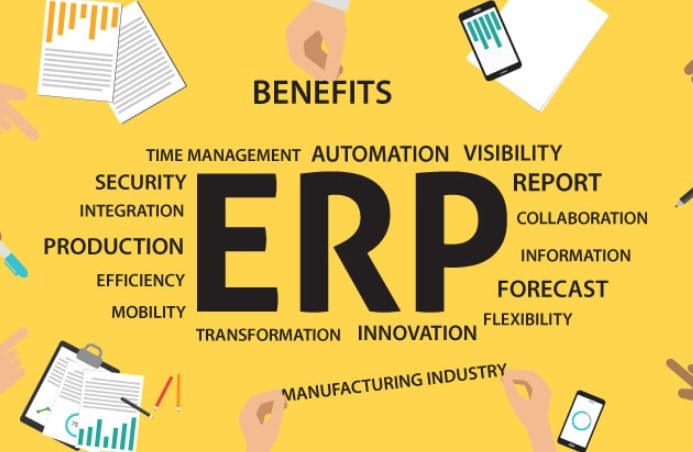ERP System For Manufacturing systems have become a cornerstone in the realm of manufacturing, revolutionizing the way businesses streamline their operations. In this article, we’ll explore the intricacies of ERP systems tailored for the manufacturing sector, uncovering the key features, benefits, challenges, and future trends that contribute to the industry’s evolution.
Introduction to ERP System For Manufacturing

Definition and Significance
ERP for manufacturing refers to integrated software solutions designed to manage and optimize various aspects of the production process. From inventory control to production planning, ERP plays a pivotal role in ensuring efficiency and agility in manufacturing operations.
Role in Optimizing Manufacturing Processes
The significance of ERP lies in its ability to provide a centralized platform for managing and coordinating diverse manufacturing activities. It facilitates real-time communication between different departments, leading to improved collaboration and streamlined processes.
Key Features of ERP Systems in Manufacturing
Inventory Management
One of the central features of ERP in manufacturing is robust inventory management. The system tracks raw materials, work-in-progress, and finished goods in real-time, preventing overstocking or shortages and optimizing the supply chain.
Production Planning and Scheduling
ERP systems enable efficient production planning and scheduling. By analyzing data and demand forecasts, manufacturers can optimize production timelines, allocate resources effectively, and minimize downtime.
Benefits of Implementing ERP in Manufacturing
Enhanced Efficiency and Productivity
Implementing ERP in manufacturing results in heightened efficiency. Automation of routine tasks, data-driven decision-making, and improved communication lead to streamlined processes and increased productivity on the shop floor.
Real-time Data Visibility
ERP systems provide real-time visibility into all aspects of the manufacturing process. Managers can access up-to-the-minute data on inventory levels, production status, and quality control, enabling proactive decision-making and reducing response times.
Challenges in Adopting ERP for Manufacturing
Integration Complexities
The integration of ERP systems with existing infrastructure can pose challenges. Customization and seamless integration are crucial to avoid disruptions in ongoing manufacturing processes.
Employee Resistance
Resistance to change is a common hurdle in ERP implementation. Employees accustomed to traditional methods may be resistant to adopting new technologies. Effective communication and training are key to overcoming this challenge.
Choosing the Right ERP System for Manufacturing
Industry-specific Customization
Manufacturers should prioritize ERP solutions that offer industry-specific customization. Tailoring the system to the unique needs of the manufacturing sector ensures optimal functionality and relevance.
Scalability for Future Growth
Selecting an ERP system with scalability in mind is vital for manufacturers looking to expand. The chosen system should accommodate growth without compromising performance or requiring a complete overhaul.
Implementation Strategies for Manufacturing ERP
Phased Approach
A phased approach to ERP implementation is recommended for manufacturing. Starting with specific modules or departments allows for a smoother transition, minimizing disruptions in daily operations.
Employee Training and Support
Comprehensive training programs and ongoing support are essential components of successful ERP implementation. Ensuring that employees are comfortable and confident in using the new system is critical for long-term success.
Real-world Success Stories in Manufacturing ERP
Case Studies of Improved Operations
- TechGear Manufacturing: Increased production efficiency by 30% after implementing ERP for better resource allocation.
- Precision Parts Inc.: Achieved a 25% reduction in production costs through streamlined processes enabled by ERP.
Positive Impacts on ROI
These success stories underscore the positive impacts of ERP on Return on Investment (ROI), showcasing how the right ERP system can lead to substantial financial gains.
Future Trends in ERP for Manufacturing
IoT Integration
The integration of Internet of Things (IoT) devices in manufacturing ERP is a growing trend. Connected machines and sensors provide real-time data for better decision-making and predictive maintenance.
Advanced Analytics for Predictive Maintenance
Manufacturers are increasingly leveraging advanced analytics within ERP systems to predict equipment failures and schedule preventive maintenance, reducing downtime and prolonging machinery life.
Common Misconceptions About ERP in Manufacturing
Dispelling Myths and Clarifying Misconceptions
It’s common for manufacturers to have misconceptions about the cost, complexity, and adaptability of ERP systems. Addressing these concerns head-on is crucial for informed decision-making.
Addressing Concerns About Cost and Complexity
While there may be initial costs and complexities associated with ERP implementation, the long-term benefits in terms of efficiency and cost savings often far outweigh the initial investment.
Conclusion: Revolutionizing Manufacturing with ERP
In conclusion, the integration of ERP systems in manufacturing is more than a technological upgrade—it’s a revolution. From optimizing production to improving decision-making, ERP has become an indispensable tool for manufacturers seeking a competitive edge in today’s dynamic business landscape.